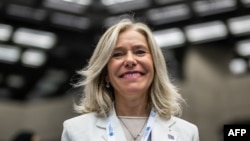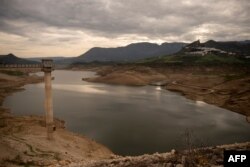Calling climate change “the greatest global threat of our times,” Celeste Saulo, the newly elected head of the World Meteorological Organization, is in no doubt that “human and industrial activities are unequivocally to blame” for this crisis.
In a briefing Tuesday to journalists in Geneva, Saulo said that a global unified commitment was required to tackle this complex challenge.
“My wish is that we will face this challenge together, as a global family, bound by a shared responsibility, a vision for the future of our children, and a common purpose,” she said.
When she assumed her post as the first female secretary-general of the WMO on January 1, Saulo upended the “old-boy’s network” that had ruled the U.N. weather agency for more than seven decades.
“I have had the opportunity to break many ceilings, crisis-results ceilings, but we are witnessing new times here,” she said.
“What women bring to organizations and particularly to WMO, I think is diversity. We have different ways of thinking about problems, issues, and finding solutions. I do not say that it is necessarily better, but it is different,” she said.
Saulo highlighted the importance of family, saying, “For me it is a building block, something that moves me forward because I am thinking about the new generations all the time.
“I cannot do something without thinking about the impact for future generations. I need to feel comfortable with what I leave to future generations.
“I have a son, a daughter and a grandson who was born less than one month ago. So, I am really moved by that, and I feel a huge responsibility because of these new generations,” she said.
Saulo, who is from Argentina, has become the first South American secretary-general of the WMO. After a distinguished academic career, she became the head of her country’s National Meteorological Service and subsequently assumed various high-level positions with WMO, lastly that of first vice president, the first woman elected to that office.
Now, as head of WMO, Saulo has called for urgent action to reduce global warming with the world edging ever closer toward the limits set in the Paris Agreement on climate change.
A recent WMO report confirmed that “2023 is the warmest year on record, by a huge margin.” It said the annual average global temperature approached 1.5 degrees Celsius above pre-industrial levels, noting the Paris Agreement calls for holding global temperatures increase to well below 2 degrees Celsius above pre-industrial levels this century.
“Climate change is the biggest challenge that humanity faces,” said Saulo. “It is affecting all of us, especially the most vulnerable. We cannot afford to wait any longer. We are already taking action, but we have to do more, and we have to do it quickly.”
“Coming from the Global South, I am acutely aware of the need to do more to prioritize the needs of the most vulnerable,” she noted.
She warned that the climate crisis was worsening the inequality crisis and undermining efforts to tackle poverty, hunger, ill-health, displacement, and environmental degradation.
“We stand at the intersection of inequality and climate change, and our strategies must reflect the urgency of the times. Our commitment to reducing inequality and development gaps is unwavering.
“We will prioritize regional and on-the-ground initiatives, ensuring innovation reaches every member, especially those with a relatively lower degree of development,” she said, adding, “Adapting to the changing climate is not a choice but an essential necessity.”
She said that WMO’s “Early Warning for All” initiative is committed to ensuring that “every person on Earth has access to timely, authoritative, and life-saving weather and climate risk information.”
The initiative has identified 30 countries, most from Africa, as well as the South and western Pacific areas, which are particularly prone to hazards and need help in resisting and recovering from climate-related disasters. Saulo said concrete results were expected to be seen by year end in these 30 countries, including Mauritius, Haiti, and Guyana.
Recognizing that adaptation must go hand in hand with mitigation, Saulo said that WMO’s Global Greenhouse Gas Watch would provide a comprehensive and accurate overview of greenhouse gas emissions to regions and countries worldwide.
She describes WMO as a member-driven organization. As such, she said it was important for WMO to understand and implement the priority needs of its 193 member states and territories.
“The implementation is for me the crucial aspect of all what we do,” she said. “If we fail at implementation, we will be failing the world.
“Showing concrete results of what we are doing, for me is at the center of my mandate,” the WMO chief said.





